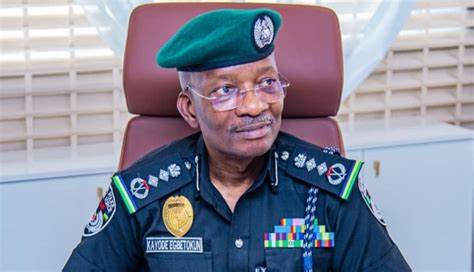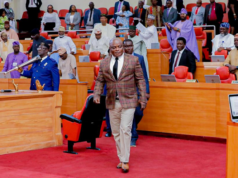By Uche Amunike
The Nigerian political space was divided yesterday, as the Inspector General of Police, Kayode Egbetokun, disagreed with the unwavering resolve of the Tinubu-led administration to reform the Nigerian Police Force and ensure nationwide security, recognizing that the notion of having a working State Police in place, is not just a policy proposal, but a potential milestone in the country’s law enforcement framework.
Recall that the IGP, Egbetokun, during the one-day national dialogue on state police, organized by House of Representatives, stated that Nigeria was not matured enough to handle the implementation of state police, mostly because it would be abused by governors, even though President Bola Tinubu, urged participants, during the flag off of the event, to consider the implications of the state police.
It was however endorsed by former President Goodluck Jonathan; Senate President Godswill Akpabio; Minister of Police Affairs, Senator Ibrahim Gaidam; Emeritus Archbishop of Abuja, John Cardinal Onaiyekan; the Ooni of Ife, Oba Adeleye Enitan Ogunwusi, with so many others.
During his remarks, former President Jonathan who was also chairman of the occasion, stated: ‘The issue today is not whether to establish state police but how it should be operated. There is no need to debate about state police. The issues of state police and Coast Guards were accepted at the 2014 National Conference.’
Jonathan also stated that the Nigeria customs service and other agencies at the border are not trained well enough to deal with criminal gangs. He therefore advised the government to concentrate on how to manage state police in a way that it will not be hijacked by the political echelon.
He also recommended that the Act establishing the Independent National Electoral Commission (INEC) be re-established, so that the police will not be used for election malpractices and stuffing of the ballot box in states.
‘So the National Assembly needs to look into all these. These are the areas that we have to concentrate on. The issue of the need for states to have their police is not negotiable. There is no way we can continue this kidnapping that is going on in this country’, he further stated.
On his part, Cardinal Onaiyekan suggested that the concerns shown by the IGP on the challenges of state policing, should be addressed before considering state police. These concerns include welfare, funding and equipment of the personnel.
The Minister of Police Affairs, Senator Ibrahim Gaidam, backed the establishing of state police, even though it contradicted the position of the IGP. Gaidam was of the opinion that the rising insecurity in the country will be tackled by a more decentralized police force. His words: ‘It is clearly imperative to come together to discuss these critical issues and work towards finding sustainable solutions that will ensure the safety and security of all Nigerians.’
‘As we gather here today, our objective is clear, to explore ways and means of addressing these issues, including the possibility of establishing the state police force, to combat the seeming unending crises.’
‘I am here to highlight the merits and challenges of implementing state police in Nigeria. I will emphasize that state police can enhance local exclusiveness’, he stated.
Another former Head of State, General Abdulsalami Abubakar, was of the opinion that Governors must remain transparent, responsible and ensure that the citizens go about their normal business in order to maintain peace and ensure that the society is safe.
He enjoined the government to make laws that will provide an orderly environment while urging citizens to desist from destroying or vandalizing public properties. He further advised that traditional institutions and royal fathers should be given specific roles to play and be made to engage in maintaining peace and order in their respective domains.







